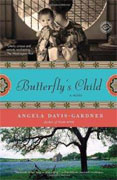Butterfly's Child
Angela Davis-Gardner
book reviews:
· general fiction
· chick lit/romance
· sci-fi/fantasy
· graphic novels
· nonfiction
· audio books
· author interviews
· children's books @
curledupkids.com
· DVD reviews @
curledupdvd.com
newsletter
win books
buy online
links
home
for authors
& publishers
for reviewers

 |
Butterfly's Child Angela Davis-Gardner Dial Press Paperback 384 pages April 2012 |
“What we imagine never happens, does it?’ he said. ‘But some things are far superior.’”This observation, made by the adult Benji, appropriately summarizes Angela Davis-Gardner’s fine novel, Butterfly's Child
“Kate imagined how odd they must appear to people who strolled past them on deck, casting covert glances their way: a blond, blue-eyed man and woman sitting in silence, on the man’s lap a child with a Japanese face and light hair. All three of them motionless, staring out at the sea like revenants, the boy immobile as a statue, clutching a multicolored string ball.”Once home in rural Illinois farm country, the convoluted relationship continues to prove difficult. Kate and Frank tell others that Benji is an orphan they adopted, hiding his true identity from even his paternal grandmother, who lives with them. Kate tries to be a decent mother to the child while struggling with a series of miscarriages. She also worries constantly that seeing Benji has made Frank fall in love all over again with the mysterious Butterfly: “She was glad the woman was dead, glad as she punched the needle through the stiff template of her pattern—such a sinful thought that she pricked her finger, then blotted it against the back of the needlepoint… By the time she had finished her first new handiwork and hung it on the wall of the parlor, a constellation of rusty blood spots filled the back of the sampler that read: Amor Vincit Omnia.”Translation: Love Conquers All. Except in this case. Ashamed of his past actions, Frank often takes his turmoil out on Benji, who is a vivid reminder of his seductive mother. Kate is correct that more and more of Frank’s thoughts center on the life he shared with Butterfly and his reprehensible desertion of her and their son. Unsuited for farming and recalling his father’s prediction of his failure, Frank begins to drink, pulling the entire family into his miasma of self-loathing. David-Gardner is a superior craftsperson, managing to make readers care not only about lovable, resilient Benji, but also tormented Kate, fussy grandmother Pinkerton, the local vet Horatio Keast, schoolteacher Miss Ladu, and even, by the novel’s end, Frank. In this respect, a not extraordinarily lengthy work becomes epic, taking us through well-researched portrayals: typical Midwestern farm struggles on the advent of advances in labor-saving machinery; life in a Japanese port city being flooded with foreigners; San Francisco right after the Great Fire; and the decades-long evolution of complex, distinctly flawed human characters. Not surprisingly, since this story is set in the early 1900s, Benji’s personal struggles involve not only trying to untangle the web of his own origins but also suffering through prejudice and isolation while being forced to grow up too fast, ultimately experiencing heartbreaking deceit. Luckily Benji does find champions: his grandmother, who intuits their connection; the kindly vet, who saves young Benji as much as the boy draws the older man out of his loneliness; the interested teacher consistently discussing Japan to offset the torment of school bullies; a farm woman who rescues him from the impending winter; and the Japanese importer whose life he alters. As Benji matures, he proves himself a responsible, caring adult driven by his childhood dream to return to Japan and find his mother’s family. Davis-Gardner was a visiting professor in Japan, an experience that became the inspiration for her acclaimed novel Plum Wine. She also wrote Felice and Forms of Shelter. She is currently an Alumni Distinguished Professor Emerita at North Carolina State University. Originally published on Curled Up With A Good Book at www.curledup.com. © Leslie Raith, 2012 |
|
|
|
 Click here to learn more about this month's sponsor! |
|
| fiction · sf/f · comic books · nonfiction · audio newsletter · free book contest · buy books online review index · links · · authors & publishers reviewers |
|
| site by ELBO Computing Resources, Inc. | |
